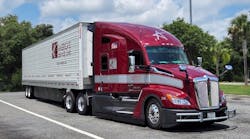A variety of reports indicate freight recovery may be farther off than anticipated, with severe third quarter losses by General Motors and Ford Motor Co. adding to the gloom.
According to a new survey of Russell 2000 index companies by Ernst & Young LLP, some 52% of polled CEOs expect no real economic upswing until 2010. Through September and mid-October, respondents cited the credit crunch (61%) and market volatility (54%) as having the largest effect on corporate growth, noted Maria Pinelli, Americas director-strategic growth markets for Ernst & Young.
She added that recent market turmoil has decreased access to capital for the responding CEOs, whether it be credit or from private equity (33%). Respondents are also tightening expenses (54%), while another 29% declared that the market’s volatility delayed a merger or acquisition, Pinelli said.
“In the next six months … U.S. economic stability reigns as the key determinant of growth, as cited by 54% of respondents, followed by access to capital and new product launches at 40% each,” she pointed out.
The $4.2 billion and $3 billion third quarter operating losses posted by GM and Ford, respectively, don’t bode well for freight flows from the automotive sector going forward, noted Eric Starks, president of economic research firm FTR Associates.
“It’s definitely bleaker for freight no matter what they do, whether they get federal loans or file for bankruptcy protection,” Starks told FleetOwner. “Ford is already planning to reduce production and that will have a real impact in terms of fewer jobs and less freight. There’s still more pain to go through.”
Motor carriers are dealing with the dearth in demand for freight in a variety of ways, from reducing the size of their fleets to offering new and different services.
“We continue our strategy of constraining the size of our asset-based truckload fleet and
growing our asset-light logistics and intermodal operations,” noted Randolph Marten, chairman & CEO of refrigerated carrier Marten Transport in the carrier’s third quarter earnings statement.
“Within our truckload operations, our employees efficiently adapted to the market conditions and focused on providing superior customer service to ensure our fleet was kept loaded with the most profitable freight available to us,” Marten added. “Our truckload operations continue to evolve as we search for expanded and more efficient ways to serve our customers. Expanding our regional capability affords us additional flexibility in allocating loads more efficiently between truck and rail intermodal service.”
Marten noted those efforts are helping his company weather the downturn. Though operating revenue, net of fuel surcharges, decreased 0.3% to $122.1 million in the third quarter this year, net income nearly doubled to $6.1 million compared with $3.1 million over the same period last year. Despite those gains, however, Marten is preparing for harder days ahead.
“For the fourth quarter, we expect freight demand to continue to decline,” he said. “Due to economic conditions, we do not expect our customers in the consumer retail business to build or refresh their inventories. With those expectations in mind, our strategy is to continue to protect our truckload rate structure … to appropriately size our fleet to existing demand, to expand our logistics, intermodal, and regional operations and to aggressively control our costs and explore new business opportunities.”




